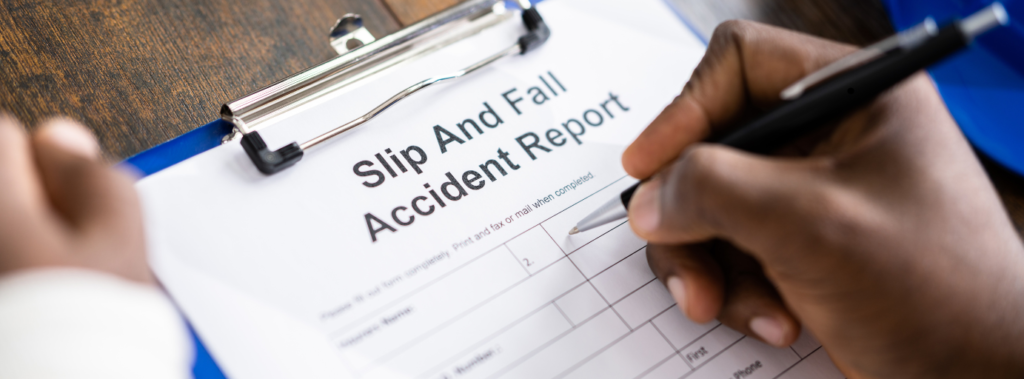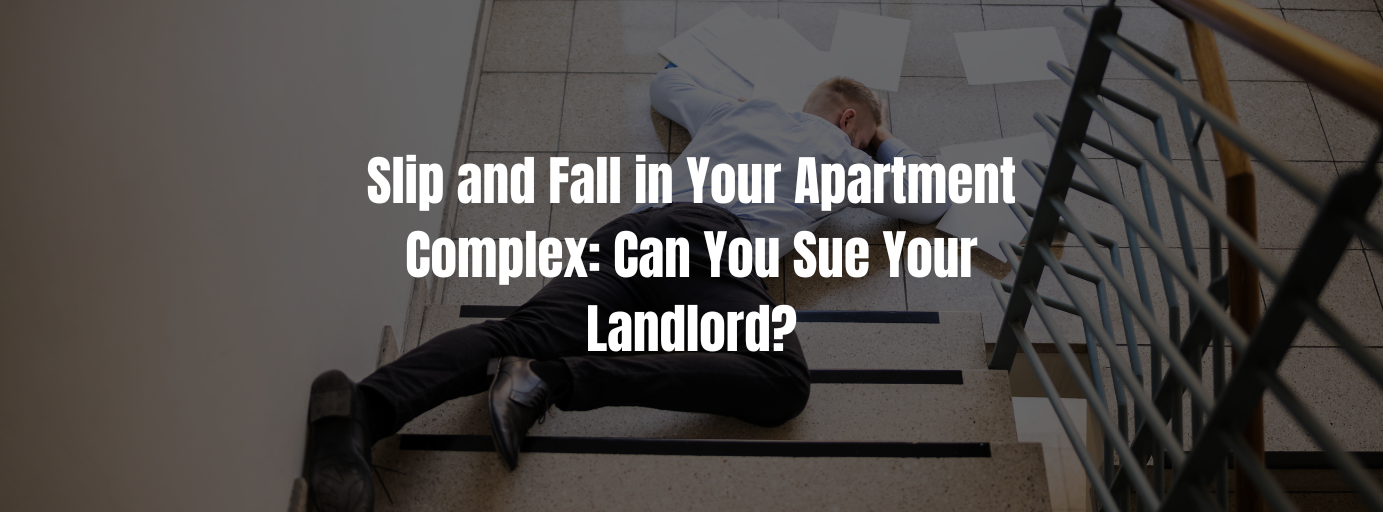Introduction
Slip and fall accidents are all too common in apartment complexes across the country. Whether it’s a wet floor in the lobby, a cracked sidewalk, or poor lighting in a stairwell, these hazardous conditions can lead to serious injuries for unsuspecting tenants. From broken bones and traumatic brain injuries to chronic pain and lost wages, the consequences of a slip and fall can be devastating, both physically and financially.
So the burning question on many renters’ minds is: Can you sue your landlord if you take a tumble in your apartment building? The answer isn’t always straightforward, as tenant and landlord responsibilities can become a complex legal gray area. In this comprehensive guide, we’ll dive into the ins and outs of apartment slip and fall accidents, exploring when you may have grounds to file a personal injury lawsuit against your landlord.
Understanding Slip and Fall Accidents in Apartment Complexes
A “slip and fall” incident refers to any situation where an individual slips, trips, or falls due to a dangerous condition on someone else’s property. In the context of apartment buildings, these accidents commonly occur in common areas like lobbies, stairwells, elevators, and parking lots.
Some of the most frequent causes of slip and fall accidents in apartment complexes include:
- Wet or slippery floors: Spills, leaks, and poor drainage can make floors dangerously slick.
- Uneven or cracked pavement: Cracked sidewalks, potholes, and other pavement issues pose tripping hazards.
- Inadequate lighting: Poor lighting in hallways, stairwells, and parking areas reduces visibility and increases fall risks.
- Lack of handrails: Missing or broken handrails provide no support for navigating staircases and ramps.
- Clutter or debris: Items left in common areas create obstacles that can cause trips and falls.

Landlord Responsibilities and Liability
As the property owner, landlords have a legal duty of care to maintain their buildings and grounds in a reasonably safe condition for their tenants. This means they are responsible for regularly inspecting the premises, promptly addressing any known hazards, and warning residents of potential dangers.
Landlord negligence that could lead to liability in a slip and fall lawsuit includes:
- Failure to properly maintain common areas: Neglecting to repair cracked pavement, replace burned-out lights, or clean up spills.
- Delayed response to reported hazards: Ignoring tenant complaints about dangerous conditions for an unreasonable amount of time.
- Lack of warning signs: Failing to post clear signage alerting tenants to hazards like wet floors or uneven surfaces.
However, landlords aren’t always automatically liable for every slip and fall that occurs on their property. Tenants also have a responsibility to exercise reasonable care for their own safety.
Tenant Responsibility and Contributory Negligence
While landlords have a duty to provide safe premises, tenants must also take steps to protect themselves. This means being attentive to their surroundings, reporting any known hazards to the landlord, and avoiding actions that could worsen dangerous conditions.
Examples of tenant negligence that could reduce a landlord’s liability include:
- Failing to report known hazards: If a tenant is aware of a dangerous condition like a leaky faucet or cracked tile and doesn’t notify the landlord, it may be harder to prove the landlord was negligent.
- Causing or worsening hazards: Tenants who spill liquids and don’t clean them up, or who leave clutter in common areas, could be found partially at fault.
- Ignoring warning signs: If clear signage is posted about a hazard, a tenant’s decision to proceed anyway may be considered contributory negligence.
Building a Successful Slip and Fall Lawsuit
If you’ve been injured in a slip and fall accident on your landlord’s property, you may have grounds to file a personal injury lawsuit. However, proving liability can be challenging. The key factors include:
- Demonstrating the landlord knew or should have known about the hazard. You’ll need to show the landlord was aware of the dangerous condition, either through tenant reports, past incidents, or regular inspections.
- Proving the landlord failed to remedy the issue in a timely manner. You must demonstrate the landlord did not take reasonable steps to fix the problem within a appropriate timeframe.
- Providing evidence the hazard directly caused your injuries. Your medical records, photos of the accident scene, and witness statements will be crucial evidence.
Gathering thorough documentation is essential, including:
- Photos or videos clearly showing the hazardous condition
- Your medical records detailing the extent of your injuries
- Witness statements corroborating how the accident occurred
- Copies of any prior tenant complaints about the hazard
Damages and Compensation
If you’re able to prove your landlord’s negligence led to your slip and fall injuries, you may be entitled to recover various types of damages, including:
- Medical expenses: This covers your past and future healthcare costs related to the accident, such as emergency treatment, hospitalizations, physical therapy, and any necessary medical equipment.
- Lost wages: You can seek compensation for income you’ve lost due to your inability to work while recovering from your injuries.
- Pain and suffering: This accounts for the physical pain, emotional distress, and diminished quality of life you’ve endured as a result of the accident.
The amount of compensation you may receive depends on factors like the severity of your injuries, the total economic losses you’ve incurred, and whether you’re found partially responsible for the accident. In general, more serious and long-term injuries tend to result in higher settlements or jury awards.
Secure the Compensation You Deserve
Turn to our experienced network of personal injury lawyers for assistance. At Claim Settlement, our team of legal experts boasts over 30 years of collective experience in successfully handling personal injury and accident cases, securing millions of dollars in settlements for our clients. Benefit from our complimentary initial consultations and rest assured, you won’t incur any fees until our network of lawyers has secured the compensation you rightfully deserve.
Don’t Wait, Act Now
If you’ve suffered an injury or been involved in an accident, reach out to us at 1-833-892-5246 for a no-obligation consultation, or email us at claim@claimsettlement.ca. Our experts will review the details of your case and guide you through the legal process, ensuring you receive the maximum compensation possible.
FAQ
[sp_easyaccordion id=”2949″]
